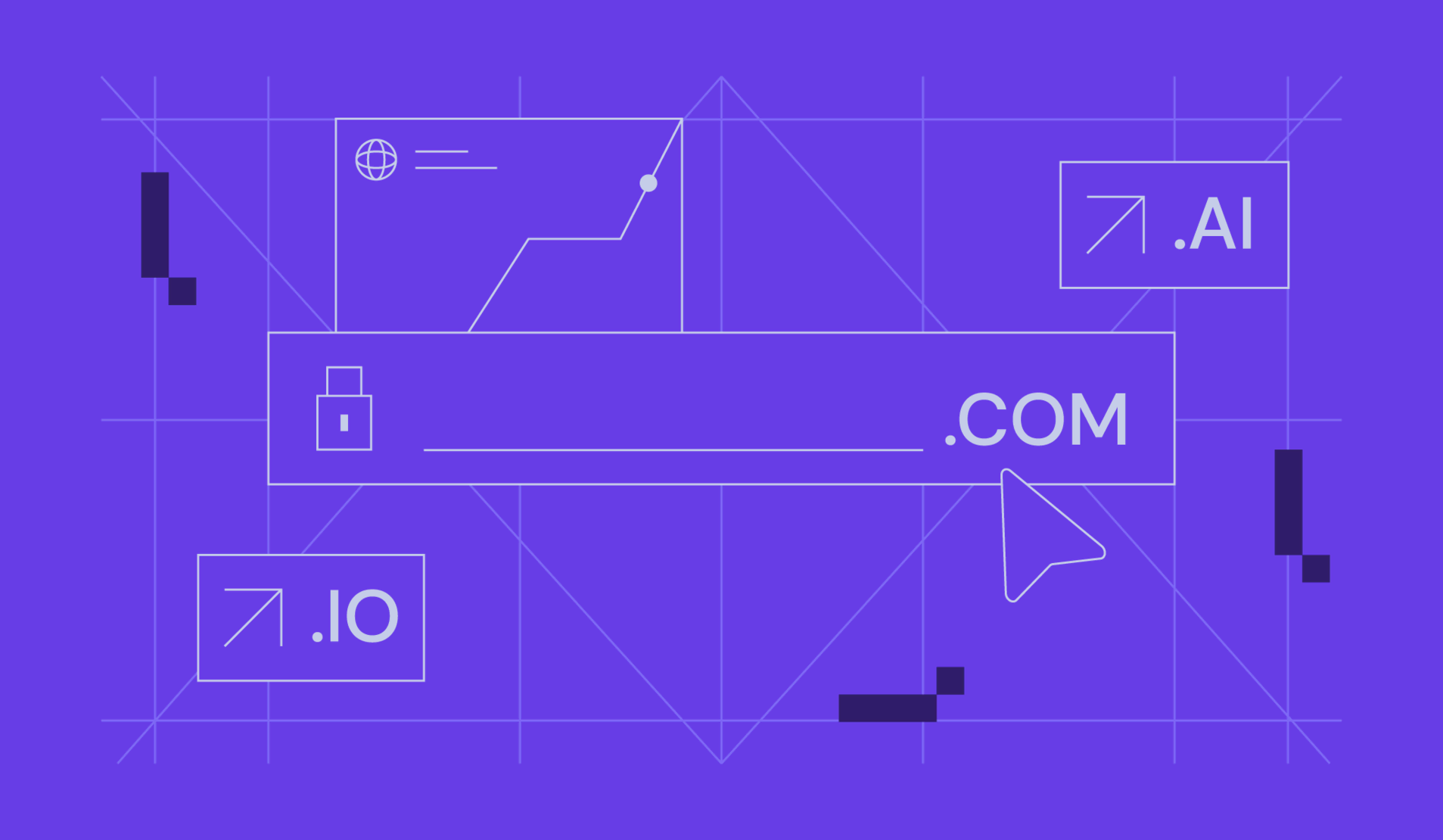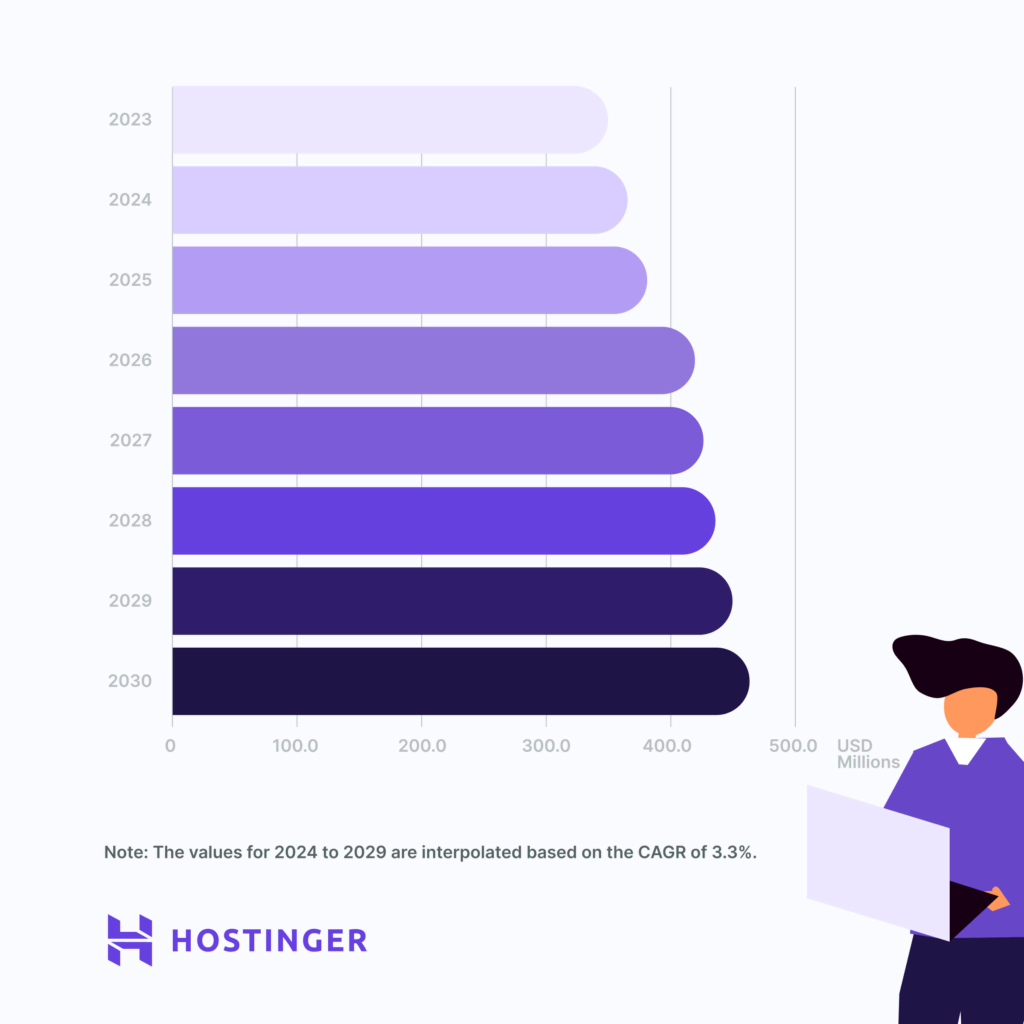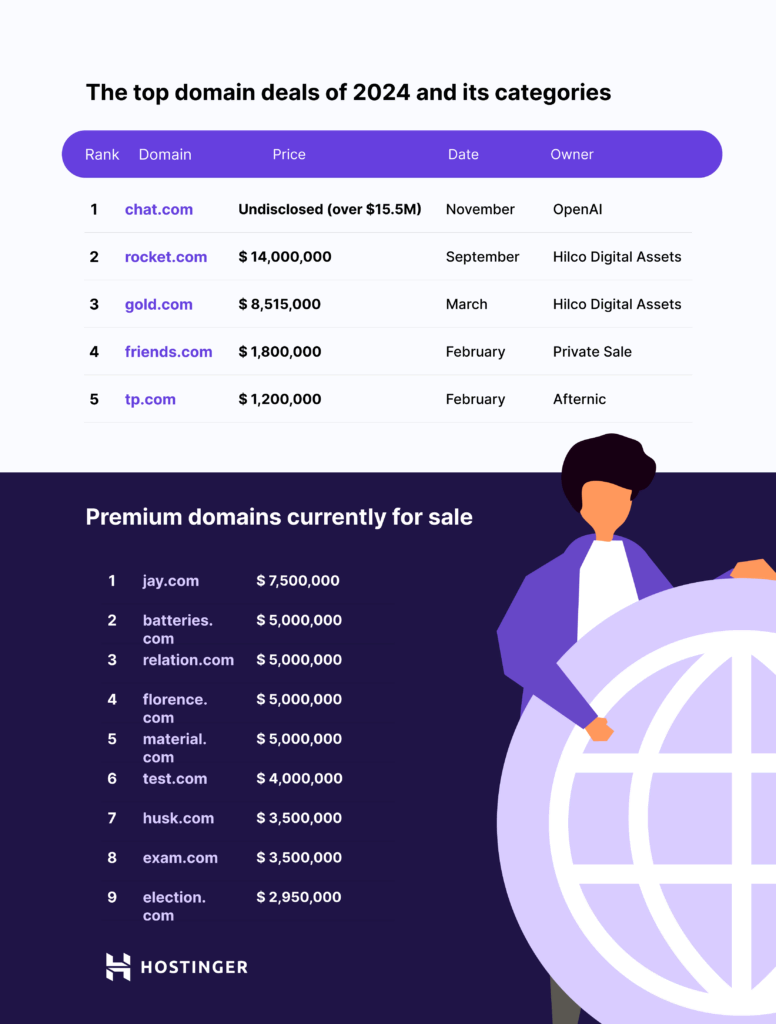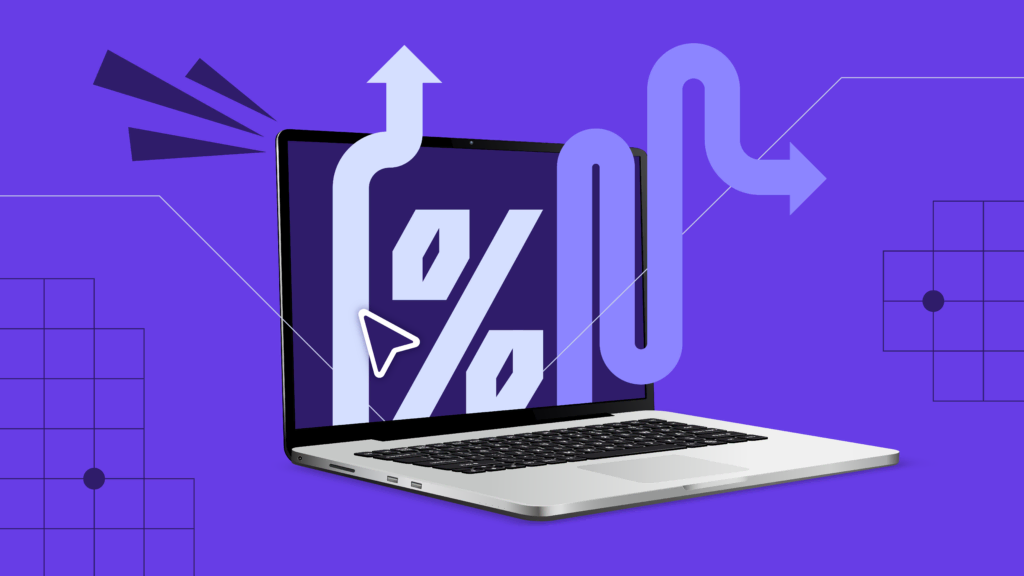The internet’s billion-dollar real estate: How domain names are shaping the digital economy

The domain name market has become a cornerstone of the digital economy. What began as a tool for navigating the web has evolved into a billion-dollar industry.
Global domain registrations reached 369.5 million in 2023, with projections indicating a rise to 464.8 million by 2030, reflecting the growing role of the Internet in global commerce, communication, and culture. Financially, the sector is thriving at a compound annual growth rate (CAGR) of 3.3%.

The history of the domain market
The domain market has undergone significant changes over the last two decades.
Twenty years ago, domains were primarily functional tools for businesses and individuals establishing an online presence. Prices for domains were relatively modest, and the market was dominated by a few key extensions like .com, .net, and .org.
A prime example of the early market was the sale of business.com, which sold for $7.5 million in the late 1990s. Fast forward to today, the domain has an estimated value of $350 million – illustrating the massive appreciation in domain values over time.
By the 2010s, the domain market began to see higher stakes. The sale of tesla.com for $11 million in 2014 reflected the growing value of premium digital real estate. In the past five years, this trend has accelerated even further, with domains like chat.com selling for $15.5 million in 2023. These high-value domain sales demonstrate the increasing importance of intuitive, short, and relevant names for driving online traffic and establishing brand authority.
The rise in prices reflects the market sentiment and the perception of the digital space. Companies are realizing that domains are no longer just addresses; they are strategic assets. A strong domain name enhances branding, establishes authority, and strengthens online visibility.
Our research also highlights the value of securing premium domains for startups and companies, as these names provide a competitive edge in a global digital economy.
Record-breaking sales: The top domain deals of 2024 and its categories
The most notable domain transactions of 2024 underscore the market’s growing emphasis on intuitive, AI-focused naming.
chat.com, purchased for $15.5 million in 2023 by HubSpot co-founder and CTO Dharmesh Shah, exemplifies the skyrocketing value of such assets. While the details of its 2024 sale to OpenAI remain undisclosed, the price is expected to surpass its previous record.
In a similar vein, Rocket Companies’ $14 million acquisition of rocket.com highlights how securing premium digital identities has become crucial for standing out in an increasingly crowded online ecosystem.

Why are domains so expensive, and who is getting all the royalty?
Domains are expensive due to several factors. First, there is the issue of scarcity. As the internet becomes more saturated, the availability of short, memorable domains becomes increasingly limited.
Second, domains serve as a strategic asset. A premium domain can dramatically enhance a company’s branding, credibility, and visibility. Whether it’s a company seeking to increase its market share or an entrepreneur building a personal brand, the right domain can provide a competitive advantage.
Furthermore, the market for domain names is often shaped by demand, particularly in niche sectors. High-value domains like .ai, for example, offer businesses a chance to immediately align with a specific industry or field – in this case, artificial intelligence – boosting their credibility and appeal.
The majority of domain payments typically go to registries that own and manage TLDs. Registrars, authorized to sell domain names to the public, earn a smaller share through markups. Governments also benefit when domains like .ai, owned by Anguilla, become popular global assets.
Domains drive success across industries
Domains have become essential in a wide range of industries:
- eCommerce: With millions of websites dedicated to online retail, having a memorable domain is crucial for customer acquisition and retention.
- Adult content: High traffic toward adult content platforms illustrates the demand and value of domains in this sector.
- Social media and networking: Platforms like Facebook, Instagram, and Twitter show the power of recognizable domains in driving billions of visits.
- Information and education: Domains like Wikipedia serve as primary resources for billions, emphasizing their societal value beyond commerce.
- Entertainment and media: Domains like YouTube lead the entertainment sector, showing the vast engagement and potential of domains in this space.
Top domains for startups and entrepreneurs
Certain TLDs (top-level domains) have become popular choices for startups and entrepreneurs due to their relevance and brand appeal:
- .com: The most widely recognized and trusted TLD, still the top choice for businesses of all sizes. It holds 37.16% of the market share with 233.6 million registered domains.
- .io: A favorite among tech startups, particularly in the blockchain and cryptocurrency sectors. With over 270,000 registrations, it commands a significant niche in the tech industry.
- .ai: The go-to TLD for companies in artificial intelligence and machine learning. 353,928 domains have been registered under .ai.
- .co: Increasingly seen as an alternative to .com, .co is popular for its short, memorable nature. With over 2 million registered domains, it’s a popular choice for startups seeking a concise, distinctive web address.
The .ai boom: Anguilla’s digital gold mine
The growing importance of domain names extends beyond corporations and startups to small nations that have discovered economic opportunities.
Anguilla, a Caribbean island with a population of just 15,000, has turned its .ai domain into a high-demand asset for the booming artificial intelligence industry.
Initially restricted to local residents, .ai domains became globally available in 2006. By 2023, the island’s government earned $32 million from registrations, contributing nearly 20% of its total revenue – a fourfold increase from pre-boom years.
Why the .ai domain is becoming the go-to choice for companies
The .ai domain has become a valuable asset for companies in the artificial intelligence sector. It immediately signals a company’s focus on AI or related technologies, making it easier for potential customers and partners to grasp its core offerings.
This allows businesses to attract a highly targeted, tech-savvy audience actively searching for AI-driven solutions in an ecosystem where .com and .net domains dominate. For startups, a .ai domain also provides an opportunity to quickly establish credibility and stand out in a competitive market.
Small nations, big gains: The economics of ccTLDs
Other small nations are also finding economic opportunities in their country-code domains (ccTLDs).
Tuvalu’s .tv domain generates approximately 8.4% of the island’s total government revenue. The most visited .tv websites include twitch.tv, the leading platform for gaming content and live streaming; pluto.tv, a free ad-supported TV service; peacock.tv, NBCUniversal’s streaming service; redbull.tv, which focuses on extreme sports and entertainment; and Vevo.tv, a streaming service for music videos featuring top artists.
While .com remains dominant with 159.9 million registrations, niche domains like .ai and .tv are growing steadily, highlighting the shifting trends in the digital economy.
Geopolitics and the digital economy: A shift in domain power
While small nations like Anguilla and Tuvalu have found economic success in managing their country-code top-level domains (ccTLDs), recent geopolitical developments in the Indian Ocean may significantly impact another high-demand domain: .io.
Traditionally favored by tech startups and the cryptocurrency sector for its connection to the tech term input/output, the .io domain is under scrutiny following a shift in sovereignty over the Chagos Islands. In October 2024, the United Kingdom transferred control of the British Indian Ocean Territory (BIOT), which administers the .io domain, to Mauritius.
This shift could have significant implications, as the International Standard Organization (ISO) is considering removing the IO country code from its list. If the change proceeds, the Internet Assigned Numbers Authority (IANA) may begin phasing out .io domains, halting new registrations and potentially affecting established sites like github.io.
The economic ripple effect
The potential phase-out of the .io domain highlights the broader economic implications of domain ownership.
For nations like Mauritius, Anguilla, and Tuvalu, managing a popular country-code top-level domain (ccTLD) offers a substantial new revenue stream with implications for both national economies and businesses. As the global tech and gaming sectors increasingly rely on ccTLDs, this shift could force companies to reconsider their digital strategies, either by adopting new domains or facing challenges in maintaining their online presence.
In the case of Mauritius, the transition from BIOT to Mauritian sovereignty could lead to the emergence of a new ccTLD, likely .mu, which could struggle to replicate the Silicon Valley cachet of .io. This shift will likely trigger significant changes in the digital landscape, especially as businesses dependent on .io race to find alternatives ahead of the five-year countdown to domain retirement.
One trend to watch in 2024: domain hacks and personalization
A key trend emerging in 2024 is the use of domain hacks – a creative approach that allows businesses to integrate the domain suffix into their brand name.
This not only transforms domain names from simple addresses into integral parts of a brand’s identity but also blends functionality with creativity. Companies can even incorporate calls-to-action (CTAs), such as buy.it.com, to engage users directly.
Personalized domains are also gaining traction. A domain name that reflects the owner or company’s name creates a sense of personal branding. For example, choosing a domain with the .it.com extension can communicate an affiliation with the global IT community, conveying authority and expertise.
This trend reflects a broader shift towards personalization in digital identity, with individuals and companies increasingly recognizing the value of domain names that mirror their unique personality or business.
Lookalike domain threat
As the domain market grows, so do the risks. A concerning trend gaining traction in 2024 is the rise of lookalike domain threats.
Scammers are increasingly leveraging the popularity of new top-level domains (nTLDs) and domain hacks to create deceptively similar addresses that mimic well-known brands. This tactic, known as domain impersonation, can trick users into visiting fraudulent websites, putting both businesses and consumers at risk.
According to Fortra’s 2023 Domain Impersonation Report, companies faced an average of 39.4 lookalike domain threats per brand in the first half of 2023. This escalating threat highlights the importance for businesses to protect their digital assets, monitor domain use, and remain vigilant against impersonation risks that could damage both reputation and security.
The future of the internet
The demand for domain names is directly tied to the growth of the Internet. Internet penetration reached 64.6% globally in April 2023, with regions like North America and Europe leading in user numbers.
Meanwhile, areas such as South Asia, Sub-Saharan Africa, and Latin America are experiencing rapid growth. Over 1 billion people in China and more than 658 million individuals in India have accessed the internet in the last three months alone.
This growing global internet accessibility is creating significant demand for domain names and hosting services, particularly in emerging markets where digital infrastructure is developing at an unprecedented pace.
As the digital landscape expands, experts suggest that the value of domain names will continue to rise.
“As Web3, blockchain domains, and decentralized web models emerge, the landscape will continue to evolve, offering new opportunities for investment and innovation,” says Vakarė Simanaitytė, Hostinger’s Content Strategist.
The continued rise in internet access and the strategic value of domain names reflects broader trends in the digital economy. From multimillion-dollar transactions to small nations like Anguilla leveraging .ai to boost their economies, the domain market is evolving into a critical component of success in the hyperconnected global economy. As competition intensifies for premium digital real estate, businesses and nations will find new opportunities to thrive through smart digital asset ownership.


